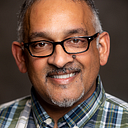Lessons In Mathematics Education From An 8 Year-Old

Amoret Lyon is 8 years-old. She lives in Italy. She loves fencing, singing, drawing, cartooning, and collecting a whole range of things — like stuffed animals, different coloured markers, etc.
In fact, she is so good at fencing, her coaches believe she has the potential to go the Olympics.
The most important to Amoret, her parents, and myself is that she loves everything that she does because it is fun an playful. Amoret Lyon is also home-schooled. She is extremely social and has plenty of opportunities to engage with other kids through all the activities she does.
It is that exact same attitude that Amoret has brought to learning mathematics.
I have been meeting with Amoret three times a week since last September. There is no curriculum I am following. I don’t assign any homework. Anything Amoret explores in mathematics is a combination of my interest and what might interest her.
While I have not been following any curriculum, I have been paying very close attention to the pedagogy of Alfred North Whitehead’s “Rhythm of Learning”. Namely, that Amoret is in the Stage of Romance.

We have now met over fifty times. I could not have predicted so much of this. And yet, her understanding and LOVE of mathematics seems boundless now.
Nowhere better was that demonstrated was when we explored exponentiation — a topic incorrectly delayed until middle school. But, we explored though a playful lens.

I drew this number a few weeks ago for Amoret. I asked what this number was? Naturally she was confused — a wonderful emotion to have in mathematics IF supported properly. Constant testing would not qualify.
She guessed “23”, but she had a feeling that this was not correct as there ws a “big number” and a “smaller number”.
Just a note, Amoret has built her multiplication fluency through the awesome resource of Multiplication By Heart.

After I explained what this number was, Amoret quickly and joyfully blurted out — “it’s a piggyback number”. Needless to say, my heart was full.

We went on to explore exponentiation and the “Base Codes” for numbers 2 to 11 — the cycle of the last digits of each base repeats. Because who doesn’t love “secret codes”!

We actually giggled at some thing because they were “boring”, like Base 10, Base 5, and Base 11, which all are the last digit(0, 5, and 1 respectively).
All this was a set up for a question that might appear as a contest question in high school.

Really, the question is asking if the sum of these numbers ends in a 0 or a 5?
We then have just know what the last digit of each “crazy large” number is. If you know — -shhhhhh — the secret base codes, it becomes quite easy.
Every fourth number raised to an exponent with base 3 will end with a “1”. Every odd number raised to an exponent with base 4 will end with a “4”.
There’s something you should also know. Amoret wants to teach this to kids her age.
To me that demonstrates the highest level of romance that one can have with mathematics — to share it with others because you love mathematics.
I had no idea of the journey I was embarking on with Amoret Lyon last September, but I knew pretty quickly that there was one more mathematics book in me — to be co-authored by Amoret Lyon.

Sometime in 2025, we will present our adventures in the wonderland of mathematics at math education conferences.
At the beginning of 2026, our book will be released.
Curiosity, awe, wonder, imagination, and love are critical attributes of children to be dearly protected and nourished. When we do, anything is possible…
That possibility must be made available to all our students in not only how we teach, but we teach.
Without content interest and curiosity for it, mathematics education is a rudderless ship with no port of call that intersects the love of mathematics through the eyes of a child.
